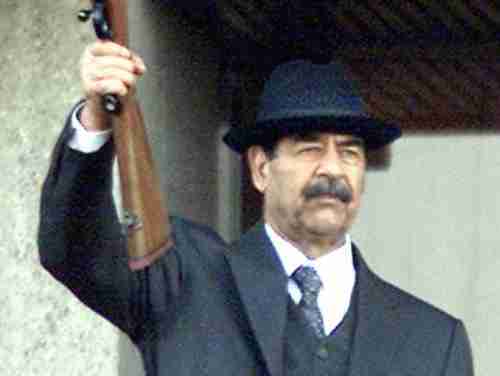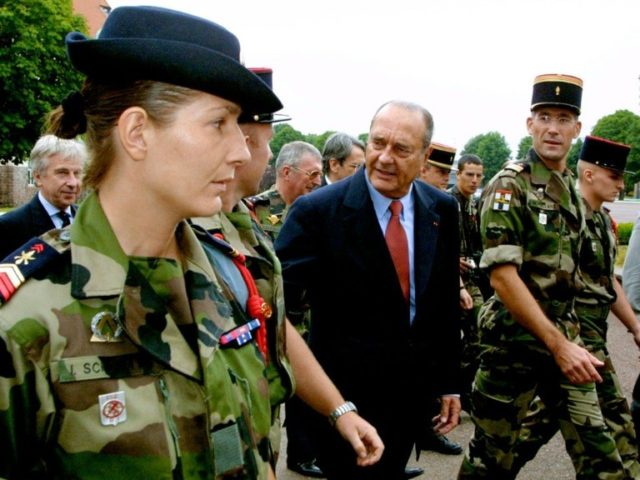This morning’s key headlines from GenerationalDynamics.com
- Fourteen companies in France on trial over Iraq war oil-for-food corruption
- Iraq War and the 58 Year Hypothesis
Fourteen companies in France on trial over Iraq war oil-for-food corruption

Saddam Hussein in 2000 (AFP)
Fourteen major French companies went on trial on Wednesday in the Appeals Court of Paris for taking part in a vast corruption scheme where hundreds of companies around the world paid $1.5 billion to Saddam Hussein in bribes and corrupt payments to win oil contracts in the Iraq War “Oil-for-food” program.
Saddam Hussein, as president of Iraq, had a long history of developing and using WMDs (weapons of mass destruction). Saddam had a long-standing program to develop nuclear weapons, and in 1981, Israeli war strikes destroyed an Iraqi nuclear reactor that could have been used to develop nuclear weapons. In 1988, towards the end of the Iran/Iraq war, Saddam had used mustard gas chemical weapons in 1988 to kill Kurds and Iranians.
In 1990, Hussein’s Iraq invaded and annexed Kuwait, resulting in the first Gulf War, which ended up ejecting Iraq from Kuwait, but left Saddam Hussein in power, still able to produce WMDs. In the years that followed, Saddam continued to develop WMDs and refused to permit U.N. inspectors to enter Iraq. In 1998, the Bill Clinton administration ordered airstrikes against Iraq because it refused to cooperate with United Nations weapons inspectors.
The second Iraq War began in 2003 at a time when almost everyone in the world believed that Saddam was continuing WMD development, and the CIA reported that the evidence supported this. During all this time from 1991-2003, Iraq was heavily sanctioned in the hope of ending the WMD program.
Saddam always complained that the crippling sanctions were hurting ordinary Iraqi people, so in 1996 instituted the “oil-for-food” program. Under this program, Saddam could sell a limited amount of oil to other countries and use the money to buy food and humanitarian goods for the Iraqi people. The United Nations was to serve as a watchdog.
Saddam corrupted the system by demanding that any company that wants to buy oil under this program would be invoiced for 110 percent of the actual cost of the oil. The 100 percent portion would be used to purchase food, and the other 10 percent would go into Saddam’s own bank account. A U.N. inquiry led by former U.S. Federal Reserve chairman Paul Volcker alleged in 2005 that the 2,200 companies involved in the programme had paid a total of $1.8 billion in kickbacks to win supply deals. Of those, 180 were French.
In 2016, French oil company Total was ordered to pay a $827,000 fine, the maximum allowed under French law, for corruption linked to the U.N. oil-for-food program. Other French companies were cleared of the charges because the situation did not match the offenses that French anti-corruption law is designed to prosecute. However, prosecutors hope that the judges in the trials that began on Wednesday for 14 companies will look at the situation differently, and will convict them.
The 14 companies include Renault Trucks, Legrand and Schneider Electric. The trial is expected to conclude by the end of November. Radio France International and Le Figaro (Paris) (Trans) and Deutsche Welle (2-Jul-2008) and Radio France International (26-Feb-2016)
Iraq War and the 58 Year Hypothesis
The Iraq War has been called the worst war in American history, mainly by people with such deficient reasoning skills that they can’t figure out that without the war we would never have known that Saddam was not developing WMDs. After the war, President George Bush was able to leverage that discovery to convince Iran and Saudi Arabia to end their own WMD programs, and Iran’s Supreme Leader Ali Khamenei issued a fatwa late in 2003 ending their nuclear program.
The most vocal opponents of launching the Iraq war in 2003 were also those who were making huge amounts of money in corrupt practices in the oil-for-food program.
Kojo Annan, the son of Secretary-General Kofi Annan of the United Nations, was heavily involved in the scheme through the Swiss company Cotecna, which won a large oil-for-food contract.
Russia benefited the most from oil-for-food corruption, winning near a third of all the oil deals. Paul Volcker’s U.N. inquiry identified the people involved, but none was prosecuted because the Russians refused to cooperate.
France was in second place in benefiting from the corrupt scheme. For years, we have had to listen to French commentators express moral superiority because they opposed the Iraq War. Actually, they were the worst of all, since the advisors to France’s President Jacques Chirac were heavily involved in the Iraq corruption. Chirac would have happily let Saddam kill thousands of people with WMDs, as long as Chirac kept making money from it.
There was something really remarkable about the 2003 Iraq War in that there was almost universal panic, an unrealistic panic, about Saddam’s development of WMDs. We do not get nearly as panicky today about Bashar al-Assad’s use of Sarin gas in Syria or Russia’s use of Novichok nerve agent to kill people in Britain.
From the point of view of Generational Dynamics, the 2003 Iraq war was an example of the “58-year hypothesis,” which says that when some sort of calamitous event occurs, then some sort of panic will occur exactly 58 years later. That’s because 5-10-year-old children at the time of the calamitous event all retire or die or lose power, all at once, 58 years later, and it is this cohort of people who panic because they suddenly realize that they will be gone and the younger generations will not be prepared. (See lengthier explanation at “The 58 Year Hypothesis”)
So the 2003 panic over WMDs in Iraq occurred 58 years after the use of nuclear weapons on Hiroshima and Nagasaki.
Another example of the 58-year hypothesis was the swine flu panic that occurred in 1976. Anyone alive at that time will remember the nationwide panic that occurred and the demands for development of a swine flu vaccine, which turned out to be a disaster. That was 58 years after the devastating Spanish Flu pandemic of 1918 that killed millions of people.
Another example was the 1987 stock market panic. If fizzled very quickly because it was not a real panic. It occurred 58 years after the 1929 stock market crash.
Another example is Israel’s invasion of Lebanon in 2006. Hezbollah abducted two Israeli soldiers near the Lebanon border. Israel went into a state of total panic and launched the war in Lebanon within four hours, with no plan and no objectives. The war was a total disaster for Israel. It occurred 58 years after the genocidal war between Jews and Arabs in Palestine in 1948.
The 58-year hypothesis has turned out to be one of the most fascinating discoveries in the development of generational theory. It certainly does not explain everything, or even many things, but it does make sense of things like the “false panics” that occurred in 1976, 1987, 2003, and in Israel in 2006. Economist (13-Mar-2008) and Council of Foreign Relations (11-May-2006) and AP (Jan 2008)
Related Articles
- Israel reveals intelligence coup on Iran’s nuclear weapons program (03-May-2018)
- Economists baffled on 30th anniversary of 1987 stock market panic (20-Oct-2017)
- Generational Dynamics historical analysis of the violence in Iraq (18-Jun-2014)
- The Iraq war may be related to the bombing of Hiroshima and Nagasaki. (17-Feb-2008)
KEYS: Generational Dynamics, Iraq, Saddam Hussein, France, Iraq war, oil-for-food program, Israel, Iran/Iraq War, mustard gas, Kuwait, Paul Volcker, Total, Renault Trucks, Legrand, Schneider Electric Saudi Arabia, Iran, Seyed Ali Hosseini Khamenei, Kojo Annan, Kofi Annan, Russia, Jacques Chirac, 58 Year Hypothesis, Japan, Hiroshima, Nagasaki, Swine Flu, Spanish Flu, Lebanon, Hezbollah
Permanent web link to this article
Receive daily World View columns by e-mail

COMMENTS
Please let us know if you're having issues with commenting.